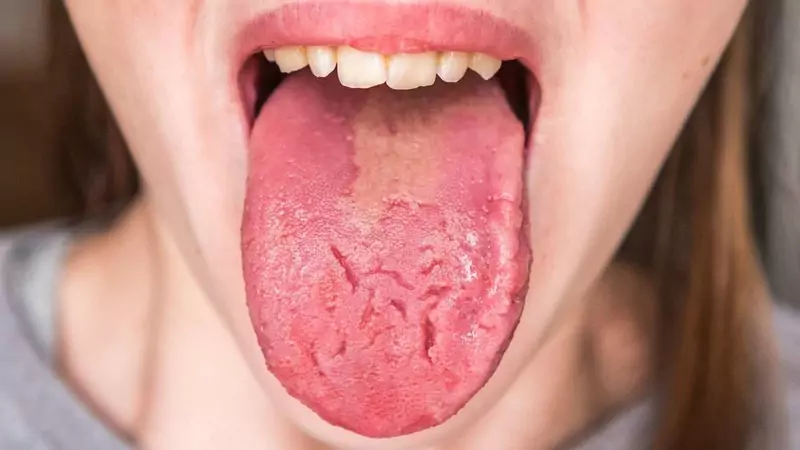Fissured Tongue
A fissured tongue (cracked tongue or grooved tongue) is a condition that affects the upper surface of the tongue and is generally not pathological. The upper surface of a normal tongue is relatively flat throughout its length. On the other hand, a fissured tongue has a distinctive groove of different sizes and depths, usually in the middle, on the upper surface of the tongue. There may be one or more fissures on the tongue.
Micro grooves that normally exist on the tongue may be deeper in some people. This can cause the tongue to have a wrinkled appearance. However, these vertical grooves on the tongue, which we call fissures, usually have no connection with a disease. A fissured tongue is found in about 5 percent of Americans.
The fissured tongue can appear at birth or develop during childhood. The exact cause of the cracked tongue is unknown. Sometimes, however, it can be associated with underlying conditions such as malnutrition, Down syndrome, etc.
Fissured Tongue Symptoms
Because of the fissure, the tongue may appear to split lengthwise. Sometimes there is more than one fissure, giving the tongue a fragmented appearance. The grooves are usually deep and very prominent. The middle part of the tongue is most often affected by the fissure or fissures. But there may also be fissures in other parts of the tongue.
Another tongue abnormality known as the geographic tongue (fissured geographic tongue) may accompany the cracked tongue. The geographic tongue presents itself as smooth and usually red spots with slightly raised edges. In this case, the tongue looks like a map. A normal tongue has small, pinkish-white projections called papillae on its surface. However, people with a geographic tongue have a reduced number of papillae on the tongue.
In general, neither a grooved tongue nor a geographic tongue is a contagious or harmful condition. Although these conditions are tongue abnormalities, they usually do not cause any symptoms in the person. However, in these cases, some people report increased sensitivity and discomfort to various foods.
Cracked Tongue Causes
Although the exact cause of the fissured tongue is unknown, it may be genetic, as it occurs more frequently in family members. Different underlying factors can also cause it. However, many also consider a cracked tongue a variation of a normal tongue.
The fissured tongue may be present during childhood. But this aspect of the tongue tends to become more severe and prominent as one gets older. Fissures may be slightly more on the tongue of men than in women. In particular, cracked tongue in older adults with dry mouth tends to have more severe symptoms. It will be beneficial for these people to use specific ADA-approved mouthwash (eg, Biotene Dry Mouth Oral Rinse or as a different choice: TheraBreath Dry Mouth Oral Rinse).
Conditions Associated with Fissured Tongue
The fissured tongue can sometimes be associated with some syndromes. In rare cases, it may also be related to conditions such as orofacial granulomatosis (swelling of the lips, mouth, and the area around the mouth) and psoriasis.
The cracked tongue can sometimes be linked to Down syndrome. Down syndrome, in other words, “trisomy 21”, is a genetic condition that can cause a variety of physical and mental disorders. People with Down syndrome have three copies of chromosome 21 instead of two.
The fissured tongue can also occur in people with Melkersson-Rosenthal syndrome. Melkersson-Rosenthal syndrome is a neurological condition. The patient with Melkersson-Rosenthal syndrome has a fissured tongue, swelling of the face and upper lip, and Bell’s palsy, a type of facial paralysis.
Fissured Tongue Treatment
A fissured tongue is usually a condition that does not require treatment. However, patients with this cracked tongue may feel slight pain and swelling on the tongue when they consume some acidic foods (tomato, plum, vinegar, lemon, melon). Apart from not consuming too many acidic foods, these patients do not need any additional advice or treatment.
The person with a cracked tongue needs to clean the food residues on the tongue. In this respect, the person needs to maintain proper oral care, such as regular brushing of the upper surface of the tongue.
If a person does not clean their tongue regularly, bacteria and plaque can collect there, causing bad breath and an increased chance of tooth decay. It will be beneficial for the person to continue routine dental care. People with a grooved tongue should visit their dentist at least twice a year for a professional oral cleaning.
References
Cleveland Clinic Journal of Medicine: “Fissured tongue”
Mayo Clinic: Diseases and Conditions, “Geographic tongue”
Oral Health Foundation: “Geographic tongue”
The American Academy of Oral Medicine: “Fissured Tongue”

